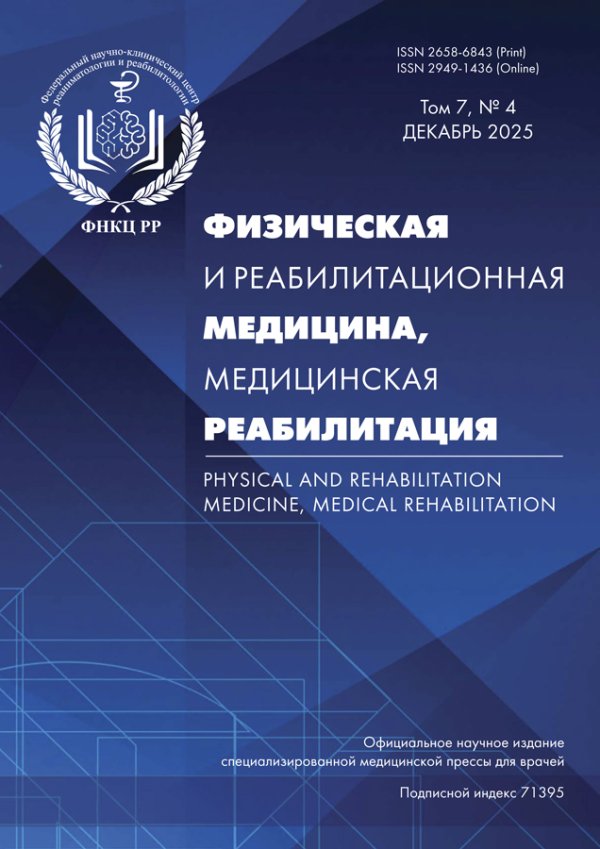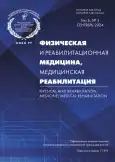Impact of chronic kidney disease on the course and outcome of COVID-19
- Authors: Sarana A.M.1,2, Shcherbak S.G.1,3, Vologzhanin D.A.1,3, Golota A.S.3, Kamilova T.A.3, Kadin S.V.4
-
Affiliations:
- Saint-Petersburg State University
- Health Committee of the Administration of Saint Petersburg
- Saint-Petersburg City Hospital № 40 of Kurortny District
- My Medical Center LLC
- Issue: Vol 6, No 3 (2024)
- Pages: 280-293
- Section: REVIEWS
- URL: https://journal-vniispk.ru/2658-6843/article/view/269354
- DOI: https://doi.org/10.36425/rehab635725
- ID: 269354
Cite item
Full Text
Abstract
COVID-19 is primarily a respiratory disease. However, patients with COVID-19 are at high risk for acute kidney injury or exacerbation of preexisting kidney disease, especially those with comorbidities such as hypertension, coronary artery disease, chronic liver disease, chronic kidney disease, and malignancies. We reviewed studies that assessed the association between chronic kidney disease and SARS-CoV-2 coronavirus infection and infection outcomes, including hospitalization, severe COVID-19, need for intensive care, COVID-19 progression, and death. The studies showed varied and often contradictory results, as the baseline data differ in many parameters, such as the period of the pandemic, quality and size of the sample, and degree of comorbidity. Nevertheless, the studies consistently revealed that chronic kidney disease is an unfavorable factor with regard to SARS-CoV-2 infection. Furthermore, concomitant chronic kidney disease predisposes patients with COVID-19 to severe COVID-19, viral pneumonia, development of acute respiratory distress syndrome, acute kidney injury, and other complications, which in turn are negative prognostic factors for mortality. Patients with chronic kidney disease who survived COVID-19 are more likely to develop post-COVID syndromes with various persistent or recurrent symptoms than convalescents without renal comorbidity. These patients require long-term monitoring and optimization of therapy and are priority for vaccination.
Full Text
##article.viewOnOriginalSite##About the authors
Andrey M. Sarana
Saint-Petersburg State University; Health Committee of the Administration of Saint Petersburg
Email: asarana@mail.ru
ORCID iD: 0000-0003-3198-8990
SPIN-code: 7922-2751
MD, Cand. Sci. (Medicine), Associate Professor
Russian Federation, 199034 Saint Petersburg; 191025 Saint PetersburgSergey G. Shcherbak
Saint-Petersburg State University; Saint-Petersburg City Hospital № 40 of Kurortny District
Email: b40@zdrav.spb.ru
ORCID iD: 0000-0001-5036-1259
SPIN-code: 1537-9822
MD, Dr. Sci. (Medicine), Professor
Russian Federation, 199034 Saint Petersburg; 9B, Borisova street, 197706 Saint Petersburg, SestroretskDmitry A. Vologzhanin
Saint-Petersburg State University; Saint-Petersburg City Hospital № 40 of Kurortny District
Email: volog@bk.ru
ORCID iD: 0000-0002-1176-794X
SPIN-code: 7922-7302
MD, Dr. Sci. (Medicine)
Russian Federation, 199034 Saint Petersburg; 9B, Borisova street, 197706 Saint Petersburg, SestroretskAleksandr S. Golota
Saint-Petersburg City Hospital № 40 of Kurortny District
Author for correspondence.
Email: golotaa@yahoo.com
ORCID iD: 0000-0002-5632-3963
SPIN-code: 7234-7870
MD, Cand. Sci. (Medicine), Associate Professor
Russian Federation, 9B, Borisova street, 197706 Saint Petersburg, SestroretskTatyana A. Kamilova
Saint-Petersburg City Hospital № 40 of Kurortny District
Email: kamilovaspb@mail.ru
ORCID iD: 0000-0001-6360-132X
SPIN-code: 2922-4404
Cand. Sci. (Biological)
Russian Federation, 9B, Borisova street, 197706 Saint Petersburg, SestroretskSergey V. Kadin
My Medical Center LLC
Email: svkadin@yandex.ru
ORCID iD: 0000-0003-1228-1914
SPIN-code: 9302-5964
MD, Cand. Sci. (Medicine)
Russian Federation, Saint PetersburgReferences
- Quintana-Lopez JM, Rodríguez L, Portuondo J, et al.; COVID-Health Basque Country Research Group. Relevance of comorbidities for main outcomes during different periods of the COVID-19 pandemic. Influenza Other Respir Viruses. 2024;18(1):e13240. EDN: YYWNUM doi: 10.1111/irv.13240
- Chronic Kidney Disease in the United States, 2021. Atlanta: US Department of Health and Human Services, Centers for Disease Control and Prevention; 2021. Available from: https://nephu.org/wp-content/uploads/2019/09/Chronic-Kidney-Disease-in-the-US-2021-h.pdf. Accessed: 15.07.2024.
- KDIGO guidelines. KDIGO Clinical practice guideline for acute kidney injury [March 2012]. Vol. 2, Issue 1. Available from: https://kdigo.org/wp-content/uploads/2016/10/KDIGO-2012-AKI-Guideline-English.pdf. Accessed: 15.07.2024.
- Jdiaa SS, Mansour R, El Alayli A, et al. COVID-19 and chronic kidney disease: An updated overview of reviews. J Nephrol. 2022;35(1):69–85. EDN: TJNCQX doi: 10.1007/s40620-021-01206-8
- Cheng Y, Luo R, Wang K, et al. Kidney disease is associated with in-hospital death of patients with COVID-19. Kidney Int. 2020;97(5):829–838. doi: 10.1016/j.kint.2020.03.005
- Petrilli CM, Jones SA, Yang J, et al. Factors associated with hospital admission and critical illness among 5279 people with coronavirus disease 2019 in New York City: Prospective cohort study. BMJ. 2020;369:m1966. doi: 10.1136/bmj.m1966
- Williamson EJ, Walker AJ, Bhaskaran K, et al. Factors associated with COVID-19-related death using OpenSAFELY. Nature. 2020;584(7821):430–436. doi: 10.1038/s41586-020-2521-4
- Schiffl H, Lang SM. Long-term interplay between COVID-19 and chronic kidney disease. Int Urol Nephrol. 2023;55(8):1977–1984. EDN: HFTSXM doi: 10.1007/s11255-023-03528-x
- Chung EY, Palmer SC, Natale P, et al. Incidence and outcomes of COVID-19 in people with CKD: A systematic review and meta-analysis. Am J Kidney Dis. 2021;78(6):804–815. doi: 10.1053/j.ajkd.2021.07.003
- Henry BM, Lippi G. Chronic kidney disease is associated with severe coronavirus disease 2019 (COVID-19) infection. Int Urol Nephrol. 2020;52(6):1193–1194. EDN: FABBKA doi: 10.1007/s11255-020-02451-9
- Flythe JE, Assimon MM, Tugman MJ, et al. Characteristics and outcomes of individuals with pre-existing kidney disease and COVID-19 admitted to intensive care units in the United States. Am J Kidney Dis. 2021;77(2):190–203.e191. doi: 10.1053/j.ajkd.2020.09.003
- Dorjee K, Kim H, Bonomo E, Dolma R. Prevalence and predictors of death and severe disease in patients hospitalized due to COVID-19: A comprehensive systematic review and meta-analysis of 77 studies and 38,000 patients. PLoS One. 2020;15(12):e0243191. EDN: QPWWFK doi: 10.1371/journal.pone.0243191
- Shea BJ, Reeves BC, Wells G, et al. AMSTAR 2: A critical appraisal tool for systematic reviews that include randomised or non-randomised studies of healthcare interventions, or both. BMJ. 2017;358:j4008. doi: 10.1136/bmj.j4008
- Ko JY, Danielson ML, Town M, et al. Risk factors for COVID-19-associated hospitalization: COVID-19-associated hospitalization surveillance network and behavioral risk factor surveillance system. Clin Infect Dis. 2021;72(11):e695–e703. doi: 10.1093/cid/ciaa1419
- Holman N, Knighton P, Kar P, et al. Risk factors for COVID-19-related mortality in people with type 1 and type 2 diabetes in England: A population-based cohort study. Lancet Diabetes Endocrinol. 2020;8(10):823–833. doi: 10.1016/S2213-8587(20)30271-0
- Degarege A, Naveed Z, Kabayundo J, Brett-Major D. Heterogeneity and risk of bias in studies examining risk factors for severe illness and death in COVID-19: A systematic review and meta-analysis. Pathogens. 2022;11(5):563. EDN: EZKLSA doi: 10.3390/pathogens11050563
- Nandy K, Salunke A, Pathak SK, et al. Coronavirus disease (COVID-19): A systematic review and meta-analysis to evaluate the impact of various comorbidities on serious events. Diabetes Metab Syndr. 2020;14(5):1017–1025. doi: 10.1016/j.dsx.2020.06.064
- Xiao W, Xu J, Liang X, et al. Relationship between chronic kidney disease and adverse outcomes of coronavirus disease 2019: A meta-analysis based on adjusted risk estimates. Int Urol Nephrol. 2021;53(8):1723–1727. doi: 10.1007/s11255-020-02748-9
- Imam Z, Odish F, Gill I, et al. Older age and comorbidity are independent mortality predictors in a large cohort of 1305 COVID-19 patients in Michigan, United States. J Intern Med. 2020;288(4): 469–476. doi: 10.1111/joim.13119
- Agur T, Ben-Dor N, Goldman S, et al. Antibody response to mRNA SARS-CoV-2 vaccine among dialysis patients: A prospective cohort study. Nephrol Dial Transplant. 2021:gfab155. doi: 10.1093/ndt/gfab155
- Grupper A, Sharon N, Finn T, et al. Humoral response to the Pfizer BNT162b2 vaccine in patients undergoing maintenance hemodialysis. Clin J Am Soc Nephrol. 2021;16(7):1037–1042. doi: 10.2215/CJN.03500321
- Jakopin E, Knehtl M, Hojs NV, et al. Treatment of acute kidney injury with continuous renal replacement therapy and cytokine adsorber (CytoSorb) in critically ill patients with COVID-19. Ther Apher Dial. 2024. doi: 10.1111/1744-9987.14182
- Filev R, Rostaing L, Lyubomirova M, et al. COVID-19 Infection in chronic kidney disease patients in Bulgaria: Risk factors for death and acute kidney injury. J Pers Med. 2022;12(10):1676. EDN: RMHAER doi: 10.3390/jpm12101676
- Hirsch JS, Ng JH, Ross DW, et al.; Northwell COVID-19 research consortium and the northwell nephrology COVID-19 research consortium. Acute kidney injury in patients hospitalized with COVID-19. Kidney Int. 2020;98(1):209–218. doi: 10.1016/j.kint.2020.05.006
- Fisher M, Neugarten J, Bellin E, et al. AKI in hospitalized patients with and without COVID-19: A comparison study. J Am Soc Nephrol. 2020;31(9):2145–2157. doi: 10.1681/ASN.2020040509
- Filev R, Lyubomirova M, Bogov B, et al. Post-acute sequelae of SARS-CoV-2 infection (PASC) for patients-3-year follow-up of patients with chronic kidney disease. Biomedicines. 2024;12(6):1259. doi: 10.3390/biomedicines12061259
- Chan L, Chaudhary K, Saha A, et al.; on behalf of the Mount Sinai COVID Informatics Center (MSCIC). AKI in hospitalized patients with COVID-19. J Am Soc Nephrol. 2021;32(1):151–160. doi: 10.1681/ASN.2020050615
- Enikeev D, Taratkin M, Efetov S, et al. Acute kidney injury in COVID-19: Are kidneys the target or just collateral damage? A comprehensive assessment of viral RNA and AKI rate in patients with COVID-19. Curr Opin Urol. 2021;31(4):363–368. EDN: RMZSBV doi: 10.1097/MOU.0000000000000901
- Mathew S, Ramaswamy S, Shiji P.V., et al. Retrospective analysis of acute kidney injury in COVID-19 infection: A single-center study from Kerala. Cureus. 2024;16(6):e61772. doi: 10.7759/cureus.61772
- Xiong F, Tang H, Liu L, et al. Clinical characteristics of and medical interventions for COVID-19 in hemodialysis patients in wuhan, China. J Am Soc Nephrol. 2020;31(7):1387–1397. doi: 10.1681/ASN.2020030354
- Choi H, Kim AY, Park I, et al. COVID-19 infection in patients with end-stage kidney disease undergoing renal replacement therapies in Korea. Kidney Res Clin Pract. 2024. EDN: IOQOQY doi: 10.23876/j.krcp.23.280
- Bae JH, Choi SK, Kim NH, et al. Use of renin-angiotensin-aldosterone system inhibitors and severe COVID-19 outcomes in patients with hypertension: A nationwide cohort study. Diabetes Metab J. 2021;45(3):430–438. EDN: DTTTGW doi: 10.4093/dmj.2020.0279
- Lopes RD, Macedo AV, de Barros E, et al. Effect of discontinuing vs continuing angiotensin-converting enzyme inhibitors and angiotensin II receptor blockers on days alive and out of the hospital in patients admitted with COVID-19: A randomized clinical trial. JAMA. 2021;325(3):254–264. doi: 10.1001/jama.2020.25864
- Bauer A, Schreinlechner M, Sappler N, et al. Discontinuation versus continuation of renin-angiotensin-system inhibitors in COVID-19 (ACEI-COVID): A prospective, parallel group, randomised, controlled, open-label trial. Lancet Respir Med. 2021;9(8):863–872. doi: 10.1016/S2213-2600(21)00214-9
- Tereshchenko LG, Johnson K, Khayyat-Kholghi M, et al. Rate of angiotensin-converting enzyme inhibitors and angiotensin receptor blockers use and the number of COVID-19-confirmed cases and deaths. Am J Cardiol. 2022;165:101–108. EDN: YAMGHX doi: 10.1016/j.amjcard.2021.10.050
- Theodorakopoulou MP, Alexandrou ME, Boutou AK, et al. Renin-angiotensin system blockers during the COVID-19 pandemic: An update for patients with hypertension and chronic kidney disease. Clin Kidney J. 2021;15(3):397–406. doi: 10.1093/ckj/sfab272
- Kaur U, Chakrabarti SS, Patel TK. Renin-angiotensin-aldosterone system blockers and region-specific variations in COVID-19 outcomes: Findings from a systematic review and meta-analysis. Ther Adv Drug Saf. 2021;12:20420986211011345. doi: 10.1177/20420986211011345
- Singh R, Rathore SS, Khan H, et al. Mortality and severity in COVID-19 patients on ACEIs and ARBs: A systematic review, meta-analysis, and meta-regression analysis. Front Med (Lausanne). 2022;8:703661. EDN: ICIYDD doi: 10.3389/fmed.2021.703661
- Morales DR, Conover MM, You SC, et al. Renin-angiotensin system blockers and susceptibility to COVID-19: An international, open science, cohort analysis. Lancet Digit Health. 2021;3(2): e98–e114. EDN: VSGSSL doi: 10.1016/S2589-7500(20)30289-2
- Smith SM, Desai RA, Walsh MG, et al. Angiotensin-converting enzyme inhibitors, angiotensin receptor blockers, and COVID-19-related outcomes: A patient-level analysis of the PCORnet blood pressure control lab. Am Heart J Plus. 2022;13:100112. EDN: DBLBYZ doi: 10.1016/j.ahjo.2022.100112
- Filev R, Rostaing L, Lyubomirova M, et al. Renin-angiotensin-aldosterone system blockers in Bulgarian COVID-19 patients with or without chronic kidney disease. Medicine (Baltimore). 2022;101(48):e31988. EDN: ISCDHC doi: 10.1097/MD.0000000000031988
- Lee SA, Park R, Yang JH, et al. Increased risk of acute kidney injury in coronavirus disease patients with renin-angiotensin-aldosterone-system blockade use: A systematic review and meta-analysis. Sci Rep. 2021;11(1):13588. doi: 10.1038/s41598-021-92323-8
- Oussalah A, Gleye S, Clerc Urmes I, et al. Long-term ACE inhibitor/ARB use is associated with severe renal dysfunction and acute kidney injury in patients with severe COVID-19: Results from a referral center cohort in the Northeast of France. Clin Infect Dis. 2020;71(9):2447–2456. doi: 10.1093/cid/ciaa677
- Banwait R, Singh D, Blanco A, et al. Renin-angiotensin-aldosterone system blockers prior to hospitalization and their association with clinical outcomes in coronavirus disease 2019 (COVID-19). Cureus. 2021;13(2):e13429. doi: 10.7759/cureus.13429
- Bowe B, Xie Y, Xu E, Al-Aly Z. Kidney outcomes in long COVID. J Am Soc Nephrol. 2021;32(11):2851–2862. doi: 10.1681/ASN.2021060734
- McAlister FA, Nabipoor M, Wang T, Bakal JA. Emergency visits or hospitalizations for cardiovascular diagnoses in the post-acute phase of COVID-19. JACC Adv. 2023;2(6):100391. doi: 10.1016/j.jacadv.2023.100391
- Chen Z, Zhang F, Hu W, et al. Laboratory markers associated with COVID-19 progression in patients with or without comorbidity: A retrospective study. J Clin Lab Anal. 2021;35(1):e23644. doi: 10.1002/jcla.23644
- Al-Aly Z, Bowe B, Xie Y. Long COVID after breakthrough SARS-CoV-2 infection. Nat Med. 2022;28(7):1461–1467. EDN: UKRBUW doi: 10.1038/s41591-022-01840-0
Supplementary files








